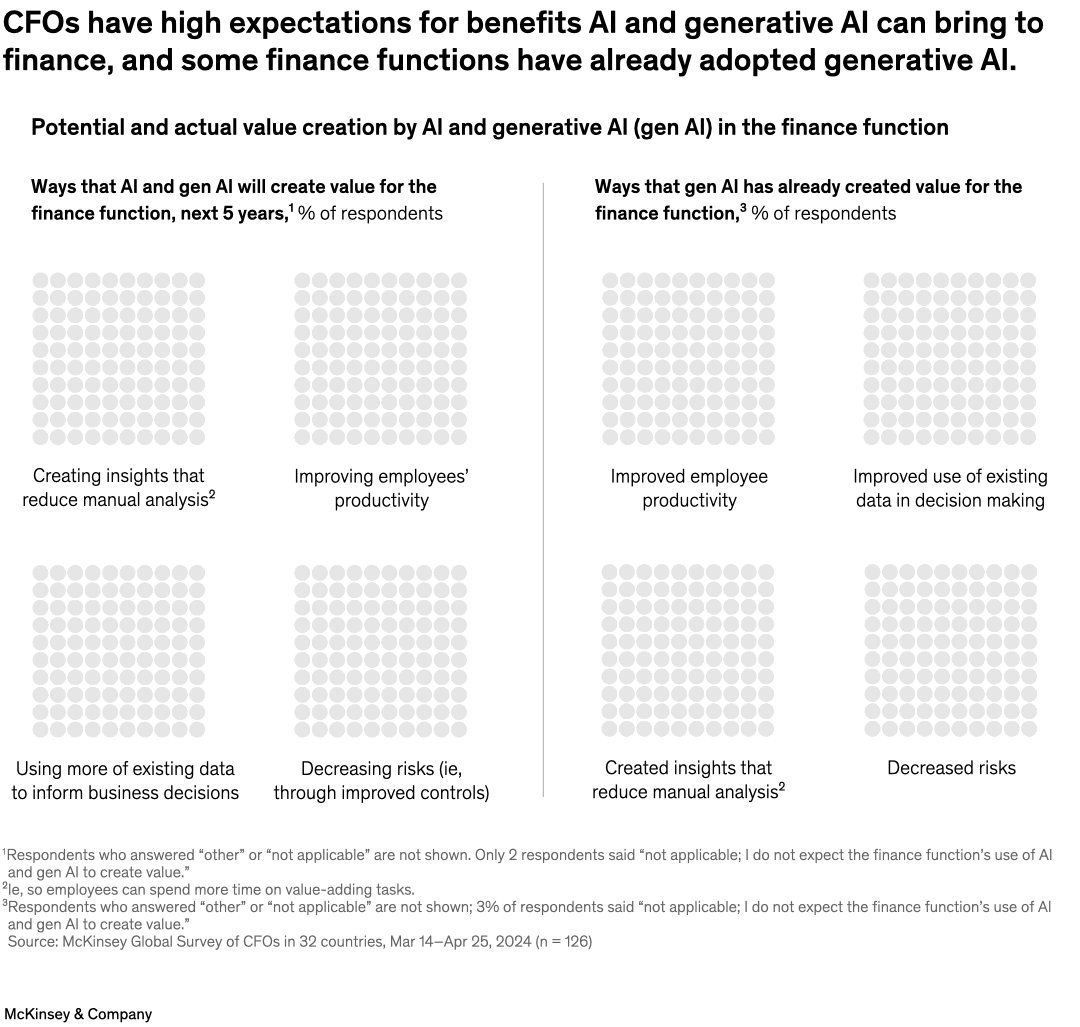 The integration of artificial intelligence (AI) and generative AI (gen AI) into finance functions is rapidly gaining traction, as organizations look to streamline operations and focus on higher-value tasks. According to a recent McKinsey Global Survey of CFOs, 85% of finance leaders expect AI tools to create significant value by generating insights that reduce the need for manual analysis. This optimism stems from AI’s potential to automate routine processes and free up employees’ time for more strategic activities.
The integration of artificial intelligence (AI) and generative AI (gen AI) into finance functions is rapidly gaining traction, as organizations look to streamline operations and focus on higher-value tasks. According to a recent McKinsey Global Survey of CFOs, 85% of finance leaders expect AI tools to create significant value by generating insights that reduce the need for manual analysis. This optimism stems from AI’s potential to automate routine processes and free up employees’ time for more strategic activities.
Boosting Productivity and Data Utilization
The survey findings indicate that the primary benefit CFOs anticipate from AI adoption in finance is an improvement in productivity. As AI handles more mundane tasks, finance professionals can dedicate their efforts to areas that drive growth and innovation. In fact, 71% of respondents currently using AI tools have already experienced a noticeable boost in employee productivity.
In addition to enhancing productivity, AI has shown promise in improving data-driven decision-making. More than half (54%) of finance functions using AI report that it has improved how they utilize existing data. This reflects AI’s capability to quickly analyze vast datasets, allowing finance teams to derive actionable insights faster and with greater accuracy.
The Next Frontier: Reducing Risk and Elevating Insights
The survey also highlights how AI is being used to mitigate risks within finance functions. Through advanced algorithms and machine learning, AI can enhance control measures and detect potential discrepancies or issues before they become significant. Moreover, 85% of CFOs expect AI to reduce the need for manual analysis in the coming years, which not only saves time but also reduces human error.

By leveraging AI to its full potential, finance teams are able to move beyond traditional methods of data processing and analysis, opening up new avenues for strategic decision-making. AI-driven insights enable organizations to adapt swiftly to market conditions, making informed choices that drive business success.
Future Prospects: A New Era of AI-Driven Finance
As AI and generative AI technologies continue to mature, the finance sector stands on the brink of a transformation that will redefine how financial operations are conducted. The pace of innovation in AI tools, coupled with the increasing availability of data, presents CFOs and finance leaders with opportunities to further automate and optimize processes, gain deeper insights, and enhance overall decision-making frameworks.
One key area where AI is expected to drive significant change is automation. While many finance teams have already adopted basic automation to handle repetitive tasks, future advancements in AI will likely see more sophisticated applications, such as cognitive automation, where AI systems can not only process data but also interpret and make complex decisions. This evolution will enable finance professionals to transition from being data processors to strategic advisors, allowing for a more agile response to business needs. Complex processes such as financial forecasting, risk assessments, and regulatory compliance will increasingly be managed by AI-powered systems, reducing human error and increasing operational efficiency.
Data analytics is another domain where AI is set to make significant strides. Today, finance functions often deal with massive volumes of structured and unstructured data, which can be overwhelming and difficult to fully leverage. AI and generative AI technologies can parse through these vast datasets to uncover patterns, trends, and insights that would otherwise go unnoticed. With AI’s ability to identify correlations across various data points, finance teams will be better equipped to make data-driven decisions that are not only accurate but also timely. Predictive analytics powered by AI will help businesses anticipate market shifts, customer behaviors, and potential risks, allowing for more proactive financial planning.
Moreover, as the use of AI becomes more widespread, its role in risk management will deepen. Advanced AI algorithms can continually monitor financial transactions, flagging potential fraud, compliance breaches, or anomalies in real-time. AI’s ability to predict financial risks with greater accuracy will enable CFOs to implement preemptive measures that protect the organization’s assets and reputation. The integration of AI into risk management processes will also make it easier for finance functions to navigate increasingly complex regulatory landscapes, ensuring compliance with local and global standards. Over time, AI systems will evolve to handle even more complex financial models, enabling organizations to mitigate both market and operational risks more effectively.
In the long term, the collaboration between AI and human expertise will also become a cornerstone of finance teams. While AI systems are excellent at processing vast amounts of data and making decisions based on algorithms, human intuition and experience will still be essential for interpreting certain insights, particularly in ambiguous or highly subjective areas. CFOs will likely invest in upskilling their teams to work alongside AI tools, allowing for a synergy that maximizes both technology’s capabilities and human strategic thinking.
As AI and gen AI technologies become more integrated into core financial operations, the role of the finance function itself may evolve. Finance professionals will be expected to act not only as financial stewards but also as innovators, leveraging AI-driven insights to shape business strategy and drive growth. This shift will necessitate changes in organizational structures, with finance teams working more closely with other departments, such as IT and data science, to ensure seamless AI integration across the enterprise.
Furthermore, the adoption of AI in finance is likely to foster a more competitive marketplace. Organizations that embrace AI will gain a competitive edge by increasing their agility, reducing costs, and making smarter, data-backed decisions faster than their counterparts. This could lead to a more dynamic financial ecosystem where the speed and quality of financial insights become critical differentiators.
In conclusion, the future of AI in finance is poised to be one of continuous innovation and value creation. As finance teams become more reliant on AI and gen AI technologies, we can expect a dramatic shift toward a more automated, data-driven, and risk-aware financial landscape. CFOs and finance leaders who invest in AI now will be better positioned to navigate the evolving complexities of the financial world, unlocking new growth opportunities and securing long-term success.
Next Step!
“Embrace BIG FIRM capabilities without the big firm price at Dawgen Global, your committed partner in carving a pathway to continual progress in the vibrant Caribbean region. Our integrated, multidisciplinary approach is finely tuned to address the unique intricacies and lucrative prospects that the region has to offer. Offering a rich array of services, including audit, accounting, tax, IT, HR, risk management, and more, we facilitate smarter and more effective decisions that set the stage for unprecedented triumphs. Let’s collaborate and craft a future where every decision is a steppingstone to greater success. Reach out to explore a partnership that promises not just growth but a future beaming with opportunities and achievements.
✉️ Email: [email protected] 🌐 Visit: Dawgen Global Website
📞 Caribbean Office: +1876-6655926 / 876-9293670 📲 WhatsApp Global: +1 876 5544445
Join hands with Dawgen Global. Together, let’s venture into a future brimming with opportunities and achievements

